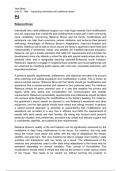Case
Unit 12 Level 3 health and social care LAC
- Institution
- PEARSON (PEARSON)
P4 Rebecca Brown Individuals who need additional support can reap huge rewards from modifications and aid, improving their overall life and enabling them to take part in their community more completely. Concerning Rebecca Brown and her family, modifications and assistance can help t...
[Show more]



